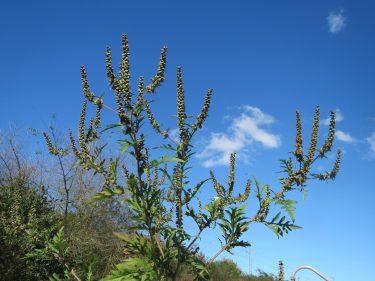
New research from the University of Washington and the University of Massachusetts – Amherst looks at how the most common cause of sneezing and sniffling in North America is likely to shift under climate change.
A recent study published in the open-access journal PLOS ONE finds that common ragweed will expand its range northward as the climate warms, reaching places including New York, Vermont, New Hampshire, and Maine, while retreating from some current hot spots.
“It was surprising that nobody had looked at ragweed distributions in the U.S.: As climate conditions are changing, where will it spread to in the future?” said corresponding author Michael Case, who did the work as a postdoctoral researcher in the UW School of Environmental and Forest Sciences.
Read more at UW Today »
